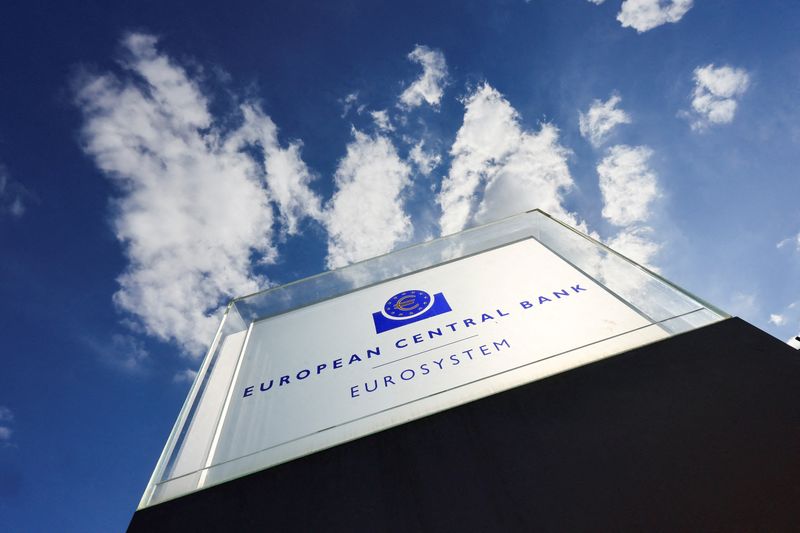By Francesco Canepa and Frank Siebelt
FRANKFURT (Reuters) - The European Central Bank will continue putting a "floor" under market interest rates in the years to come, but banks will play a greater role in deciding how much liquidity they want, four sources told Reuters.
The ECB is reviewing how it steers short-term interest rates in a new era in which inflation is higher and the massive amount of cash pumped into the banking system via stimulus programmes over the last decade is no longer needed and even creates some unwanted side-effects.
For much of the past 10 years the mechanism was simple: The ECB kept rates at zero or lower and flooded banks with more cash than they needed via bond purchases and loans, to encourage them to lend and revive inflation that was then too low.
This removed the need for banks to borrow from the ECB and pinned the overnight rate that banks charge each other to the one the ECB pays on deposits.
This framework needs changing now that interest rates are far above zero and massive amounts of excess reserves are unnecessary -- and are even causing huge losses to the ECB and some of the 20 central banks around the euro zone.
Policymakers meeting in Frankfurt last week agreed that the ECB would stick to a "floor" system, where the central bank effectively sets the lowest rate at which banks would lend to each other, the sources said on condition of anonymity because the deliberations are confidential.
But there is an important twist: The ECB will not single-handedly decide how much liquidity it provides to the banking system once it has finished draining excess reserves some years from now, the sources added.
Instead, policymakers agreed commercial banks would help determine that by borrowing the reserves they need from the ECB, in a similar vein to what the Bank of England is doing.
To facilitate this, the ECB will make it cheaper for banks to borrow by lowering the rate on its weekly cash auctions, currently at 4.5%, and bringing it closer to its 4.0% deposit rate, the sources said.
This so-called "narrow corridor" would reduce the financial penalty and the stigma for banks that are short of cash, particularly in the transition phase.
Policymakers also agreed they would tolerate some fluctuations in the Euro Short-Term Rate (ESTR), the benchmark in the inter-bank market, around the ECB's own deposit rate.
They expect to announce this new framework -- known in market parlance as a "demand-driven floor" -- next month, potentially as early as the ECB's non-policy meeting on March 13, the sources added.
For now, no change is planned for banks' minimum reserve requirements, which will remain at 1% of customer deposits. But the sources said that some individual policymakers are keen for such a move and may propose it.
The sources added that there was still debate on how big the ECB's bond portfolio should be and whether it should mostly be comprised of short-term securities or also of longer-dated ones.
An ECB spokesperson declined to comment.
For now, this discussion is little more than theoretical.
The ECB still owns some 4.7 trillion euros ($5.1 trillion) worth of bonds, meaning the banking sector as a whole will have more reserves than it needs until 2029, according to the ECB's own estimates.
This is the result of successive bond-buying programmes through which the ECB massively increased the amount of reserves in the banking system to fight low inflation and the financial impact of the COVID-19 pandemic.
ECB President Christine Lagarde said earlier this month the central bank will continue to have "a combination of a portfolio of bonds, but also lending operation of different maturities" on its balance sheet.
A staff paper found the ECB could halve its stock of bonds by mid-2026 but would then have to resume purchases to underpin banks' lending to the economy.
The ECB's rate on bank deposits is currently at a record-high but ECB policymakers have hinted they expect to start cutting it later this year.

ECB board member Isabel Schnabel was the first to suggest the central bank for the euro zone could take a leaf out of the Bank of England's book in a speech last year.
($1 = 0.9229 euros)